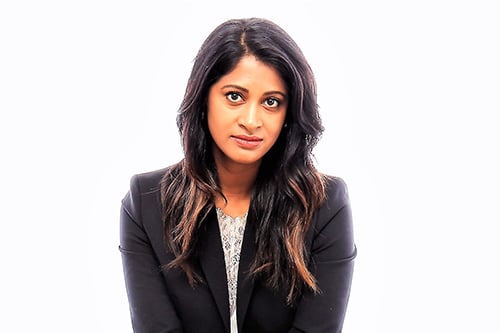

“I don’t think you’re born a leader or born with confidence or bravery or boldness. Instead, through a repeated set of experiences, you start to reinforce certain ideas about yourself.”
According to Rekha Skantharaja (pictured), the CEO and president of Tangram Insurance Services, the time is right for the nature of the conversation around diversity and inclusion within the insurance industry to make a fundamental change. So much of the dialogue surrounding women in insurance is generic in origin and built to reinforce the idea that women are inherently risk-averse or less suited to a competitive business environment.
“I think in this day and age, many women are actually more open to really just going for it if they are given the chance. And we need to stop telling women they are risk-averse, and instead start encouraging them to make a go of their professional careers,” she said. “I am very open to people seeing what it took to get to a place of success that others may aspire to. And it’s important they know that there is nothing extraordinary about the journey, there’s no magic in it, the road was not paved with roses. There were so many bumps and bruises along the way.”
“I moved from a small brokerage firm in San Francisco to nationally run distribution and marketing for an insurance company and I knew nothing about how to do that. I have no idea what I said to them at 26 to make them hire me but it was enough for me to get in and to hang on by my pinkies and then figure it out from there. So, I think it’s really important that you’re honest with people and you just don’t present this carefully curated version of who you are. It does a disservice to women who think that you just showed up in your Louis Vuitton’s and your impeccable suit and that you were perfect all the time. It’s just not the way it worked and it still doesn’t work that way. Life continues to present a series of adversities and you just figure it out. But I think more of us being less perfect and more honest is what’s needed.”
Throughout her own life, and particularly the last few months in America where deep systemic racism continues to cause pain society, Skantharaja said she has been on a journey to understand what diversity truly means. When she first joined Tangram, her focus was on making the culture as positive as possible and this meant fixing the dynamics, both operational and cultural, which were broken. Building the business up again meant understanding the core capabilities of the business and rebranding them in the market, and this included recruiting the right people for the job.
“I don’t think I was going about diversity by design,” she said. “It was evolving by default. I was just head down trying to do the basic things that needed to be done to get the organisation moving in the right direction. I think it was only after a few years of getting things growing, and when I took the helm as president in 2013, that I started to become a little bit more calculated in the diversity initiative really… I wanted more women in positions of influence, in positions driving revenue, not just as assistants, not just in marketing, or human resources but I wanted really smart women working beside me that are creative and energetic and really talented.”
Read more: The power of emotional flexibility
Skantharaja noted that one of the best ways to counteract toxic behaviour is by being successful. Success is currency and, having reached a position to do so, the next step is to become a voice for others in the industry. This can be done in many ways, from taking part in D&I initiatives, to being mindful of recruitment processes and who sits on your board, to making sure that there is equal pay and equal opportunity for all your staff. If a business has a progressive and inclusive culture and is also highly successful, then you become a much more powerful and more credible ambassador when looking to help change other people’s cultures.
“This is what I’m doing at my company,” she said. “We’re a small company, just 30 people located in the Bay Area and we have progressive culture and we’re making waves. And to make real change happen, you need a microphone, and that’s why you link up with the right people that are also looking to make massive change, or who at least are willing to give you the microphone to drive this transformation… It only seems right that those of us who are in positions of power or influence use what we have at our fingertips to do more.”
